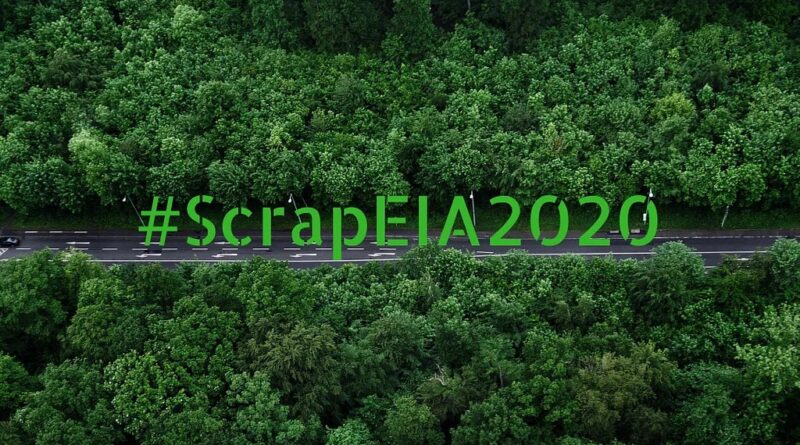Withdraw the EIA 2020 Draft Notification
In March 2020, a draft notification for Environment Impact Assessment 2020 was issued by the Ministry of Environment, Forests and Climate Change (MoEFCC). This is an important notification, since all new infrastructure projects – and expansion of existing ones – such as roads, mining projects, factories, and power plants, are required to conduct a mandatory Environment Impact Assessment and submit a report to the Ministry.
An EIA report assesses how a project will impact the environment and is the basis on which the MoEFCC will approve or reject a project. The draft notification has been heavily criticized for fundamentally dismantling environmental safeguards to promote ease of doing business. It undermines the right of every citizen to a clean environment and subverts the democratic process.
Also Read: Draft EIA Notification is an attempt to weaken regulation, silence affected communities
The Ministry has invited public comments on the draft notification until 11th August 2020, for which this email address has been provided: eia2020-moefcc@gov.in.
Concerned citizens may write to MoEFCC demanding withdrawal of EIA 2020 draft notification.
Copy to: mefcc@gov.in; eia2020-moefcc@gov.in; pjavadekar@gmail.com; dgfindia@nic.in; secy-moef@nic.in; secy-moef@nic.in
Shri Prakash Javadekar
Union Minister of Environment Forests and Climate Change
Indira Paryavaran Bhawan
Jor Bagh – New Delhi
Subject: Plea to withdraw the Environment Impact Assessment 2020 Draft Notification
Shri Javadekar,
I write to you as a concerned citizen regarding the draft notification of the Environment Impact Assessment (EIA), 2020. The proposed draft notification is not in conformity with the powers conferred to it under its parent legislation, the Environmental Protection Act, 1986, and it fundamentally changes the EIA process. It does this by
- Greatly reducing the rigor and number of regulatory oversights
- Reclassifying various industries so they are not required to get environmental clearance
- Compromising on public hearings with their scope and duration reduced.
- Normalising environmental violations
I, therefore, request the MoEFCC to withdraw, and shelving the EIA 2020 draft notification, and instead, strengthen the EIA 2006.
My key concerns with the EIA 2020 draft notification:
- Legitimising post-facto environmental clearances
The EIA 2020 draft notification directly contradicts the basic precautionary principle of environmental governance. It legitimises post-facto clearance, so a project would be able to run even without environment clearance. Thus, the notification will regularise violations, when instead it needs to take stringent action against the defaulting project proponent and shut down violating projects. Such post-facto clearances for infrastructural expansions are known to cause irreversible damage to the ecology in regions that have high biodiversity value. The idea that environmental degradation can be compensated monetarily is a flawed concept. The damage to the quality of water, soil, air; on ecosystems and wildlife, and indeed, human health, is often irreversible.
A recent example of the dire consequences of post-facto regulation is the gas leak at the LG Polymers factory in Visakhapatnam on 7th May 2020, which killed 12 people, and left several hundred ill, and ailing. This unit was operating without an Environmental Clearance (EC), and was due to be considered for grant of a post-facto EC.
- Exclusion of major industries from the EIA process
The EIA’s scope has shrunk vastly with this notification, in direct contradiction to its mandate of safeguarding the environment. It reclassifies 40 types of industries under the B2 category so that they are exempted from needing prior environmental clearance. The construction industry is one such beneficiary, as the new draft requires that only the largest industries be fully scrutinised while the others escape appraisal. The move is alarming, since the construction industry is one of the most polluting industries, and in urban areas, it is one of the main contributors to increased air pollution levels.
At a time of such an existential crisis, India must strengthen environmental laws and ensure accountability from polluting industries.
- Subverting the public hearing process
One key feature of the EIA 2006 notification is that it empowers citizens to voice their opinions regarding new projects through public consultations. This is a hallmark of democratic decision-making, and a crucial step in ensuring accountability from potentially polluting industries.
The EIA 2020 draft notification exempts various types of projects from having to conduct public hearings before beginning construction, including B2 projects. Additionally, expansions up to 50 percent are exempted from the public hearing. Exempting projects from public hearing strips citizens—often vulnerable communities—from having any voice in decisions that will directly impact their health and well-being, and affect their livelihood. A recent example of this was seen in Baghjan, Assam, where a gas-rig operated by Oil India Ltd (OIL) leaked uncontrollably for 12 days before catching fire. The continuous leak of toxic gases like methane, propane, and propylene combined with oil and condensate has severely affected agricultural fields of local communities, while also displacing them to temporary refugee camps. OIL has escaped conducting public hearings before expanding for drilling in this landscape and was given an EC, regardless.
The importance of public consultations has been repeatedly highlighted by the Honourable Supreme Court, as in the case of Lafarge Umiam Mining Private Limited v. Union of India. Removing public consultations takes away from local communities their democratic right and the only opportunity to voice their concerns on projects and other developments that directly impact their lives.
- Citizens cannot take cognizance of violations
The power to officially report environmental violations in projects under the EIA 2020 Draft Notification currently rests only with the project developers and government authorities, leaving no scope for directly affected communities to report violations.
- Impact on wildlife and habitats, including tiger landscapes
Even though the projects falling under the purview of the EIA (and otherwise) have profound impacts on wildlife and their habitats, the EIA process has fallen woefully short of addressing these concerns, a failing that continues in the draft notification. This failure to factor in wildlife considerations is one we can ill-afford, given the unprecedented extinction rates and the collapse of nature.
- Historically, Expert Appraisal Committees have not had the domain expertise to deal with impacts on wildlife, and thus, this aspect continues to be neglected. Even for projects fringing Protected Areas, in forests, and other high biodiversity landscapes, there is no assessment from the point of view of wildlife conservation.
- One critical area where such oversight is needed is for railway projects which have enormous impacts on wildlife and natural landscapes. Frequent wildlife mortality is noted due to collision with trains, including animals like tigers, elephants, leopards. The linear infrastructure associated with railways fragments of natural landscapes. The lacunae need to be addressed to strengthen the EIA process.
- Various linear infrastructure projects like highways, multi-modal corridors, etc. have been reclassified as ‘B2’, and thus are exempted from a full appraisal and public hearing. Many times, such projects involve fragile ecosystems like forests, wetlands, grasslands, floodplains, and deserts. Constructions here would likely cause irreversible damage to wildlife habitat and ecosystem functioning.
- The EIA 2020 draft notification includes only eco-sensitive zones notified by the MoEFCC. This will exclude many wildlife habitats that have not been officially notified.
- The EIA 2020 draft notification permits activities such as “leveling of the land without any tree felling” before EC is granted. This can irreversibly damage threatened and important ecosystems like grasslands, wetlands, etc.
- India is home to an astonishing diversity of wildlife, including wide-ranging species like tigers, elephants, leopards, bears, etc., whose ranges extend well beyond PAs, and often, into human-dominated landscapes. Many endangered species like wolves, leopards, Lesser Floricans, Great Indian Bustards, are also found outside PAs. Any environmental impact assessment must acknowledge that wildlife is found in a diversity of landscapes, and holistically assess how development projects may potentially impact these populations. The EIA 2020 draft notification, in its current form, will potentially cause irreversible damage to habitats that sustain these populations outside PAs.
I am also deeply concerned that inviting public comments on the EIA 2020 Draft Notification during COVID19 lockdown, at a time when the country is grappling with a pandemic and humanitarian crisis. This is especially since vulnerable communities who are directly affected by polluting projects lack the technology and access will find themselves unable to take part in this exercise.
The climate crisis will only worsen our challenges. A Government of India report by the Ministry of Earth Sciences released in June 2020, titled ‘Assessment of Climate Change over the Indian Region’ warns: “the rapid changes in India’s climate [projected by climate models] will place increasing stress on the country’s natural ecosystems, agricultural output, and freshwater resources, while also causing escalating damage to infrastructure. These portend serious consequences for the country’s biodiversity, food, water and energy security, and public health.”
In light of the above concerns, I request the MoEFCC to withdraw and shelve the EIA 2020 Draft Notification and instead strengthen the EIA 2006. I request you to kindly acknowledge the receipt of this letter.
Yours sincerely,




